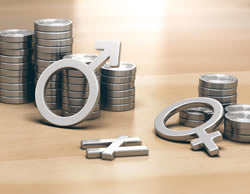Maya Salam* says common misconceptions keep many people from accepting the existence and causes of the gender pay gap.

Photo: Olivier Le Moal
If I had 5 cents for every time someone told me, “The gender pay gap is a myth,” I may have made back the income I’ve lost over the years for being a woman.
It’s not a myth.
And yet the nuance required to explain what perpetuates these misconceptions is not the stuff made for 280-character sound bites on social media, where sweeping dismissals (Men work longer hours! Men pick higher-paying careers!) can quickly snowball.
In the US, 2 April was Equal Pay Day — created in 1996 by the US National Committee on Pay Equity, a coalition of women’s, civil rights and labour groups, to draw attention to gender pay disparities.
The day marks about how long into 2019 American women would have to work to earn what their male counterparts already earned last year.
I asked Jessica Bennett, The New York Times’s Gender Editor and author of the book Feminist Fight Club, to demystify some commonly misunderstood aspects of the pay gap.
Here’s what she said.
The pay gap doesn’t account for women’s job choice
Bennett: While it’s true that women are more likely to work in lower-paying fields like education and health care, the pay gap also persists within those fields.
As our colleague Claire Cain-Miller has written, female food preparers earn 87 per cent of what male food preparers earn, according to data from Claudia Goldin, a Harvard economist.
(Female surgeons earn 71 per cent of what male surgeons earn in the same specialties, Professor Goldin found.)
The gap persists because women take time off to have children
Bennett: Women’s compensation does often suffer when they return to work after having children.
But even in their first year out of university, childless women earn 93 per cent of what their male peers do, even if they had a similar grade point average and were working in the same fields.
Women get paid less because they have less education
Bennett: Actually, more women than men have earned bachelor’s and master’s degrees since the 1980s.
And for the past 10 or so years, they have also earned more doctoral degrees.
Women don’t get paid well because they don’t negotiate well
Bennett: That has long been a factor in the pay gap.
But a 2018 study, published in the Harvard Business Review, found that — perhaps as a result of all that talk about women not negotiating — women are asking for raises as often as men, though they are less likely to get them.
Maybe in part because when women ask, they can be perceived as “demanding.”
(Remember that essay that Jennifer Lawrence wrote, about not getting paid as much as her male co-stars? She said she “didn’t want to seem ‘difficult’ or ‘spoiled.’”)
OK, but we’re on our way to closing the gap, right?
Bennett: If you consider the year 2059 soon, sure.
That’s how long it will take in the United States, according to the Institute for Women’s Policy Research, at the current pace of change.
By the numbers
Here are some more figures you might want to know:
80 Cents
That’s the median amount that women who work full-time, year-round in the United States are paid for every dollar their male counterparts earn, according to US census data analysed by the American Association of University Women.
$10,169
That’s how much the pay gap costs American women each year, according to the National Women’s Law Center, which based the figure on the difference between women’s and men’s median annual earnings for full-time, year-round workers.
Over the course of a 40-year career, that amounts to $403,440.
1 in 3
That’s the number of Americans who are unaware of the wage gap, according to research by LeanIn.org.
Congrats! You’re no longer one of them.
* Maya Salam writes about gender issues for The New York Times. She tweets at @Maya__Salam.
This article first appeared at www.nytimes.com.











